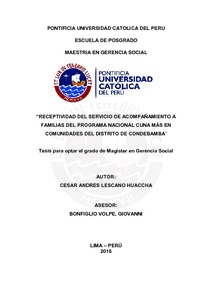| dc.contributor.advisor | Bonfiglio Volpe, Giovanni | |
| dc.contributor.author | Lescano Huaccha, Cesar Andrés | es_ES |
| dc.date.accessioned | 2018-05-03T18:07:12Z | es_ES |
| dc.date.available | 2018-05-03T18:07:12Z | es_ES |
| dc.date.created | 2018 | es_ES |
| dc.date.issued | 2018-05-03 | es_ES |
| dc.identifier.uri | http://hdl.handle.net/20.500.12404/11990 | |
| dc.description.abstract | El Servicio de Acompañamiento a Familias del Programa Nacional Cuna Más en
el distrito Condebamba, provincia Cajabamba, departamento de Cajamarca. Es
una oportunidad de desarrollar y fortalecer conocimientos, capacidades y
prácticas de cuidado y aprendizaje en las familias. El servicio se desarrolla a
través de acciones con las familias y comunidad, con el fin de mejorar el
desarrollo infantil de los niños y niñas menores de 36 meses. Sin embargo, esta
oportunidad no es aprovechada en su totalidad por factores que determinan la
baja receptividad del servicio por parte de familias, autoridades y pobladores.
Los factores influyentes en la baja receptividad son: reducida participación del
padre en la visita al hogar; material educativo deteriorado e incompleto;
autoridades no se comprometen activamente; comité de gestión y consejo de
vigilancia realizan sus funciones parcialmente; ciertos facilitadores no cumplen
con sus actividades; finalmente, el nivel de manejo de información de los actores
respecto al servicio es bajo.
Cabe resaltar que a pesar de la baja receptividad, el servicio tiene resultados
positivos evidenciados por los diferentes actores. Los niños y niñas usuarios han
logrado: regular sus emociones, tienen facilidad de aprender cosas nuevas, son
seguros, autónomos, con capacidad para relacionarse con sus pares, adultos y
su entorno. Otro aspecto, es el cambio en los cuidadores respecto: al tiempo de
atención que dedican a sus hijos e hijas, y la práctica de actividades realizadas
en la visita al hogar.
Los factores que determinan la baja receptividad del servicio por las familias,
autoridades y pobladores, ha motivado la presente Tesis. El propósito es diseñar
estrategias que mejoren: la calidad de las visitas y el trabajo con los cuidadores;
la gestión y vigilancia comunitaria de los comités y consejos de vigilancia; el
acompañamiento permanente en los procesos por los acompañantes técnicos y
especialistas; finalmente la eficiencia en el seguimiento y monitoreó. | es_ES |
| dc.description.abstract | The Servicio de Acompañamiento a Familias of the Programa Nacional Cuna
Más in the Condebamba district, Cajabamba province, department of Cajamarca.
It is an opportunity to develop and strengthen knowledge, skills and practices of
care and learning in families. The service is developed through actions with
families and community, in order to improve the child development of children
under 36 months. However, this opportunity is not fully exploited by factors that
determine the low receptivity of the service by families, authorities and residents.
The influential factors in the low receptivity are: reduced participation of the father
in the home visit; deteriorated and incomplete educational material; authorities
do not actively commit themselves; management committee and supervisory
board perform their functions partially; certain facilitators do not comply with their
activities; finally, the level of information management of the actors regarding the
service is low.
It should be noted that despite the low receptivity, the service has positive results
evidenced by the different actors. Children users have managed to: regulate their
emotions, they are able to learn new things, they are safe, autonomous, with the
ability to relate to their peers, adults and their environment. Another aspect is the
change in the caregivers regarding: the time of attention they dedicate to their
children, and the practice of activities carried out during the home visit.
The factors that determine the low receptivity of the service by families,
authorities and residents have motivated the present Thesis. The purpose is to
design strategies that improve: the quality of the visits and the work with the
caregivers; community management and monitoring of vigilance committees and
councils; the permanent accompaniment in the processes by the technical
accompaniers and specialists; finally the efficiency in monitoring and monitoring. | es_ES |
| dc.description.uri | Tesis | es_ES |
| dc.language.iso | spa | es_ES |
| dc.publisher | Pontificia Universidad Católica del Perú | es_ES |
| dc.rights | info:eu-repo/semantics/openAccess | es_ES |
| dc.rights.uri | http://creativecommons.org/licenses/by-nc-nd/2.5/pe/ | * |
| dc.subject | Programa Nacional Cuna Más (Perú) | es_ES |
| dc.subject | Niños--Programas sociales--Condebamba, Valle (Perú) | es_ES |
| dc.subject | Albergues infantiles--Perú | es_ES |
| dc.title | “Receptividad del servicio de acompañamiento a familias del programa nacional cuna más en comunidades del distrito de Condebamba” | es_ES |
| dc.type | info:eu-repo/semantics/masterThesis | es_ES |
| thesis.degree.name | Maestro en Gerencia Social | es_ES |
| thesis.degree.level | Maestría | es_ES |
| thesis.degree.grantor | Pontificia Universidad Católica del Perú. Escuela de Posgrado | es_ES |
| thesis.degree.discipline | Gerencia Social | es_ES |
| renati.discipline | 314127 | es_ES |
| renati.level | https://purl.org/pe-repo/renati/level#maestro | es_ES |
| renati.type | http://purl.org/pe-repo/renati/type#tesis | es_ES |
| dc.publisher.country | PE | es_ES |
| dc.subject.ocde | https://purl.org/pe-repo/ocde/ford#5.09.00 | es_ES |






